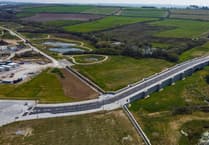Spaceport Cornwall has received a blow following Virgin Orbit filed for bankruptcy in the US.
The company, which is owned by Richard Branson, has made the drastic move after failing to secure new investment.
Virgin Orbit had announced last week it was axing 85 per cent of its workforce, or 675 employees.
Virgin Orbit CEO Dan Hart said the company had “taken great efforts" to address its finances and secure more funding, "we ultimately must do what is best for the business."
He said that Virgin Orbit will now concentrate on finding a buyer for the business "to provide clarity on the future of the company to its customers, vendors, and employees".
The company's shares plunged by more than 44 per cent in after-hours trading in New York on Thursday.
Sir Richard's investment firm Virgin Investments has injected £8.8m into Virgin Orbit "to fund severance and other costs related to the workforce reduction".
Virgin Orbit said it expects the severance payments and other costs to total around $15m.
Virgin Orbit going into bankruptcy follows the historic mission to deploy satellites into space from Spaceport Cornwall ending in failure on January 9 after a rocket fuel filter had become dislodged, causing one of the engines to overheat.
Virgin Orbit, which was headquartered in Long Beach, California, flew most of its missions out of the Mojave Air and Space Port.
The company had pledged to return to Spaceport Cornwall as soon as later in the year to launch the first satellite into space from UK soil.
British taxpayers' money was among the £20 million that has so far been thrown at the Spaceport Cornwall project, from a consortium including the local council, Virgin and the UK Space Agency.
Cornwall Council is said to have paid Virgin Orbit more than £1million when the company used Spaceport Cornwall for its first European launch.
The mission had been billed as a major milestone for UK space, marking the birth of a home-grown launch industry.
Spaceport Cornwall’s development was expected to create around 150 jobs and allow the UK to compete in the global market for deploying small satellites into Earth orbit — an industry forecast to be worth £3.9 billion by 2030 which Branson is hoping to tap into.





Comments
This article has no comments yet. Be the first to leave a comment.